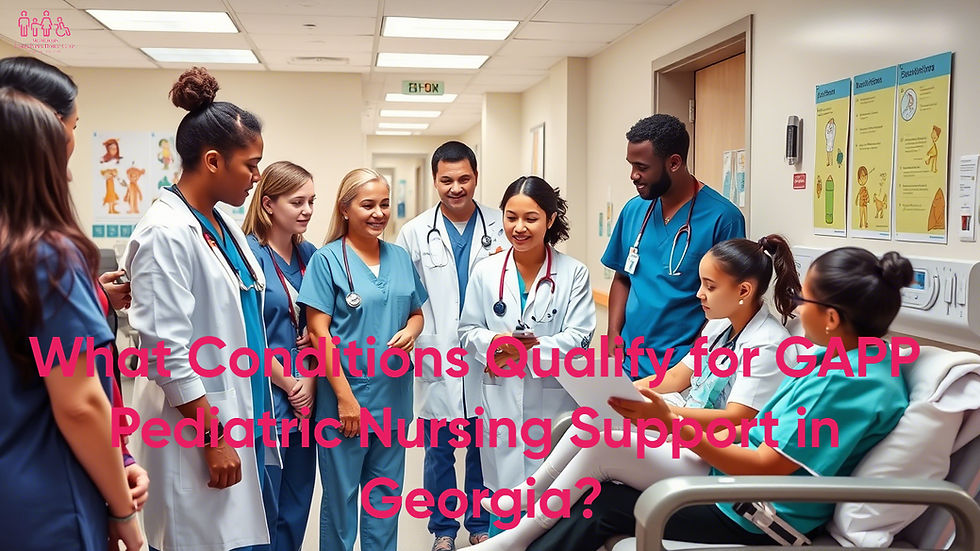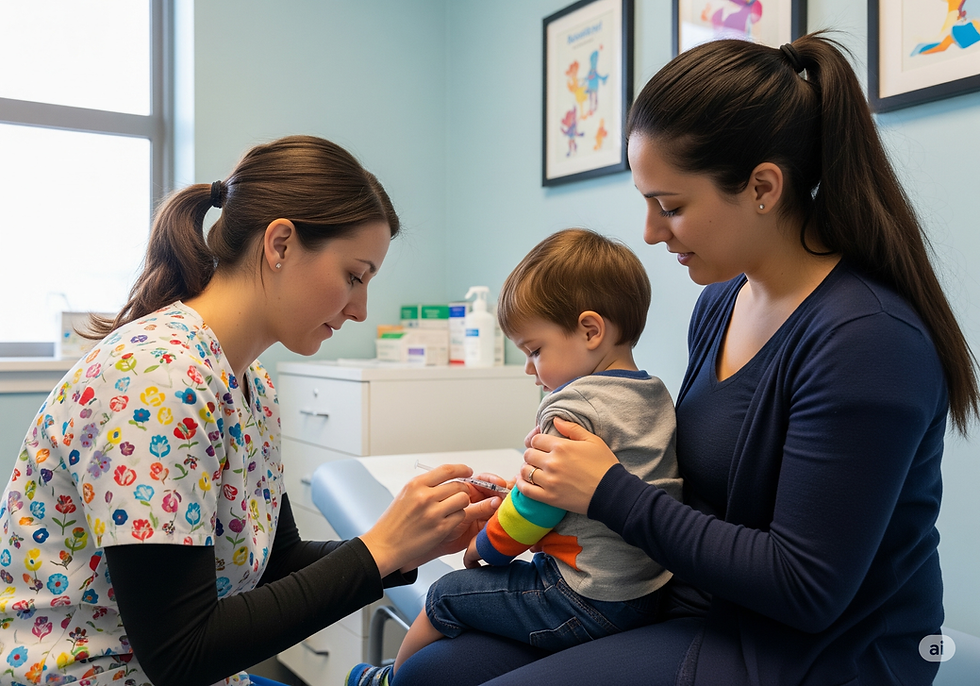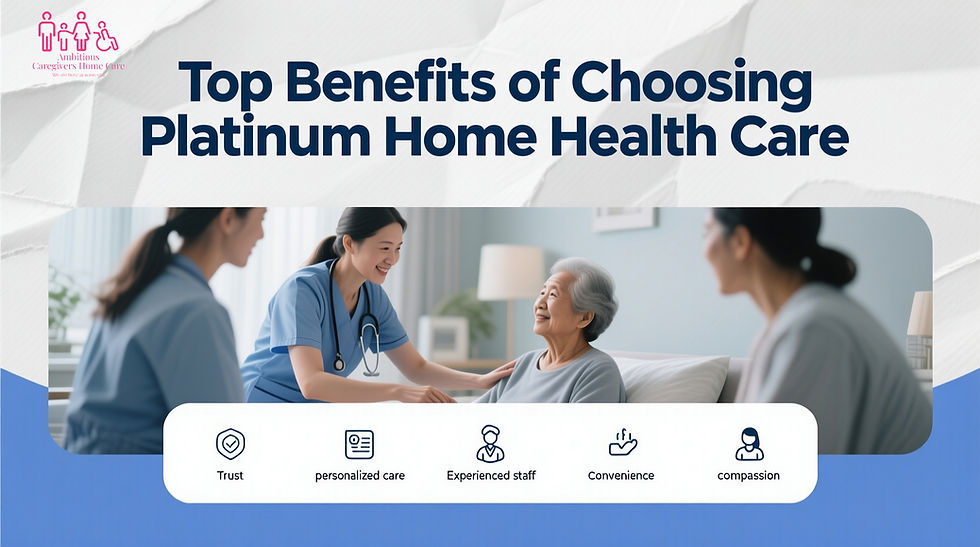What Conditions Qualify for GAPP Pediatric Nursing Support in Georgia?
- ambitiouscaregiver
- Jul 1
- 4 min read
Introducation
Navigating medical support for your child can feel overwhelming, especially when your child needs consistent care at home. Thankfully, Georgia families have access to GAPP pediatric nursing services, a lifeline for children with complex medical needs. But with eligibility being a big question mark for many parents, it’s crucial to understand: What conditions actually qualify for GAPP pediatric nursing support in Georgia?
Whether you’re a parent searching for answers or a caregiver helping a family navigate the process, this guide will walk you through everything you need to know about qualifications, common medical conditions accepted by the program, and how to get started.

Understanding GAPP Pediatric Nursing Services
What is GAPP?
GAPP stands for the Georgia Pediatric Program, a Medicaid-based initiative offering in-home nursing services and personal care support for medically fragile children under the age of 21. The goal is to allow children to receive the medical care they need in a comfortable, home setting without the constant stress of hospitalization.
GAPP pediatric nursing services are not just about clinical tasks. They include everything from skilled nursing care (like medication administration or feeding tube support) to personal care assistance with bathing, mobility, and more.
The Core Eligibility Criteria
To qualify for GAPP pediatric nursing services, a child must:
Be under the age of 21
Be a resident of Georgia
Be Medicaid-eligible or receive Medicaid waiver
Require medically necessary skilled nursing or personal care
Be stable enough to receive services at home (rather than in a hospital)
However, what often confuses parents is the specific diagnoses or conditions that may qualify a child for services. Let’s break that down.
Common Medical Conditions That Qualify for GAPP Support
Neurological Disorders
Children with conditions like cerebral palsy, epilepsy, traumatic brain injury, or severe developmental delays often qualify for GAPP pediatric nursing services. These conditions may require ongoing monitoring, seizure management, or help with mobility and feeding.
Respiratory Conditions
Kids dependent on oxygen, tracheostomy, or ventilators can receive care under GAPP. In-home nurses ensure that respiratory needs are managed safely, reducing emergency room visits and keeping kids in their home environment.
Gastrointestinal or Feeding Issues
If a child needs a feeding tube (G-tube, J-tube) or suffers from failure to thrive due to poor nutrition absorption, GAPP often steps in to provide feeding assistance, monitor intake, and educate families on feeding techniques.
Cardiac Conditions
Serious congenital heart defects or chronic cardiac conditions can lead to fatigue, oxygen issues, or other complications. GAPP nurses help monitor vitals and give medication, offering peace of mind for parents.
Genetic or Chromosomal Disorders
Children with Down syndrome, Rett syndrome, muscular dystrophy, or similar conditions often qualify. These disorders can affect multiple systems and require constant care, physical support, and medication management.
Behavioral or Mental Health Conditions (with medical complexity)
GAPP typically does not support behavioral-only diagnoses like ADHD or autism unless they are paired with a physical condition that requires nursing. However, if a child is autistic and has feeding issues, seizures, or is non-verbal with severe mobility challenges, they may qualify.
What Services Are Actually Provided?
Families approved for GAPP pediatric nursing services can receive a customized care plan that may include:
In-home skilled nursing (RN or LPN level)
Personal care services (bathing, dressing, toileting help)
Medication administration
Feeding tube care
Tracheostomy and ventilator support
Vital signs monitoring
Mobility assistance
Developmental support and education for caregivers
These services are generally provided through certified nursing agencies and are based on a set number of hours per week determined by the child's needs.
How to Apply for GAPP Pediatric Nursing Support
Here’s a simplified path to getting started:
Speak with your child’s primary care doctor or specialist to determine medical necessity.
Contact a nursing agency in Georgia that provides GAPP pediatric nursing services they’ll help with the paperwork.
The agency will conduct a nursing assessment and submit the required forms to Georgia Medicaid for approval.
Once approved, services begin with a tailored schedule based on the child’s unique needs.
The process can take anywhere from a few weeks to a couple of months, so it’s best to get started early especially if your child is being discharged from a hospital or rehab facility.
FAQ: GAPP Pediatric Nursing Services
1. Can my child receive GAPP services if they’re already in school?
Yes, GAPP supports care before and after school. Some children even receive care at school through coordination between nurses and educators.
2. Do you need a doctor’s recommendation for GAPP?
Absolutely. A physician’s referral or medical order is required to start the application process for GAPP pediatric nursing services.
3. Are all nursing services free through GAPP?
Yes, if your child qualifies and is covered under Medicaid, the services come at no out-of-pocket cost to the family.
4. Can a family choose their own nursing agency?
Yes. Families can select from a list of approved agencies that provide GAPP Home care services. It's essential to find an agency that fits your family’s schedule and needs.
Conclusion: A Lifeline for Families Facing Medical Challenges
The Georgia Pediatric Program (GAPP) isn’t just another Medicaid service it’s a vital support system for families raising children with complex medical needs. Knowing that GAPP pediatric nursing services cover a range of serious medical conditions can make a world of difference when you’re figuring out how to manage daily life.
Whether your child needs tube feeding, respiratory care, or help getting through the day safely, GAPP allows them to remain at home, surrounded by the people they love.
And with more families turning to GAPP Home care services, programs like these are helping to make Georgia a more supportive, accessible place for medically fragile children.



Comments